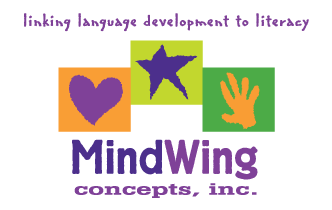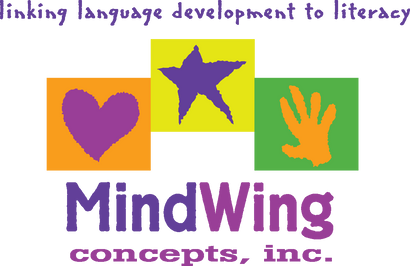Menu
-
- Home
-
About Us
-
The Approach
-
Focus Areas
-
MindWing Learning
-
Learning Resources
-
SHOP
-
Blog
-
- About MindWing
- Our People
- Contact Us
- Your Account
- Login
-
United States (USD $)

Adult/Child Interaction
by Maryellen Rooney Moreau October 29, 2010 2 min read
Adult/Child Interaction with Lauren (age 2) & Nana (Maryellen Rooney Moreau, M.Ed. CCC-SLP, President and Founder of MindWing Concepts, Inc.)
Here is Maryellen having a conversation with her two-year-old granddaughter Lauren. Notice how Maryellen used a cuddly toy cow to encourage Lauren to remember a visit to a farm. The two had experienced the event is real time. This interaction centers on the memory of the visit and is expressed as a personal narrative.
Maryellen begins by talking about the Descriptive Sequence: characters (cow, herself and Lauren) and the setting (a dairy farm where Lauren frequently visited with her grandparents and her great-grandmother on Sunday afternoon rides). Scaffolding the actions of cows in general followed this general description (Action Sequence). Finally the verbalization of a kick-off (Reactive Sequence) and talk about feelings (Abbreviated Episode) rounded out this delightful conversation.
Notice Lauren’s facial expressions related to emotion words! (Happy actress, sad actress, overwhelmed actress, etc.)
There is much in the research concerning the personal narrative as a tool to foster the development and understanding of mental states: thoughts, memories, beliefs, desires, plans - and the emotions behind them.
The actual “talking about events remembered and emotions related to those events” promotes mental state understanding and development of Theory of Mind, the ability to take perspective of others. Over time children participating in such interactions, particularly with their mothers, become able to talk about their feelings, compare their thoughts, memories and beliefs as well as their plans and intentions. Mind-Mindness (Nelson 2005) is the term given to such parent/child interactions which focus on mental states including emotions.
Our early childhood tools such as Braidy, the StoryBraid® provides the overall structure to talk about actions, memories and emotions for academic and social growth.
Reference: Nelson, K. (2005). In J. Astington & J. Baird (Eds.) Why Language Matters for Theory of Mind. London: Oxford Press.
Maryellen Rooney Moreau
Maryellen Rooney Moreau, M.Ed., CCC-SLP, is the founder of MindWing Concepts. She earned her Bachelor of Arts degree in Communication Disorders at University of Massachusetts at Amherst as a Commonwealth Honors Scholar, and a Masters of Education in Communication Disorders at Pennsylvania State University. Her forty-year professional career includes school-based SLP, college professor, diagnostician, and Coordinator of Intervention Curriculum and Professional Development for children with language learning disabilities. She designed the Story Grammar Marker® and has been awarded two United States Patents. She has written more than 15 publications and developed more than 60 hands-on tools based on the SGM® methodology. Maryellen was awarded the 2014 Alice H. Garside Lifetime Achievement Award from the International Dyslexia Association, Massachusetts Branch.
Leave a comment
Comments will be approved before showing up.
